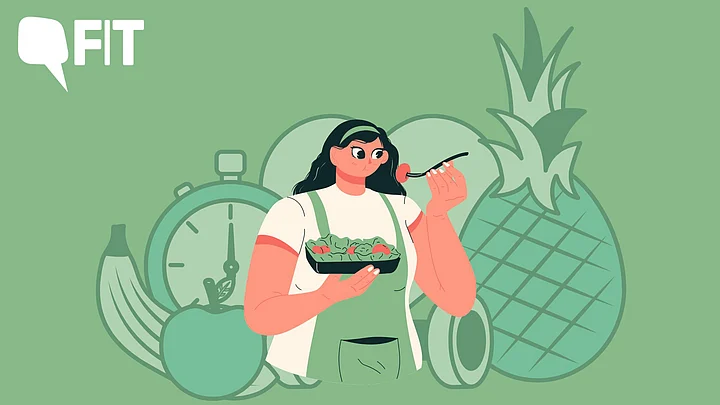Eat your meals on time, they say, but what determines the right time? Should we eat during fixed hours? Not touch anything till it's time for the next meal even if we feel hungry?
To listen to your body or to stick to a strict routine, the hungry tummy's dilemma are a real pain. So why not just eat when your body tells you?
Let's introduce the concept of 'intuitive eating'. We spoke to Dr Priyanka Rohatgi, Chief Nutritionist, Apollo Hospitals, and Kalpana Gupta, Clinical Nutritionist, Max Smart Super Speciality Hospital, Saket.
What Is Intuitive Eating?
Dr Priyanka Rohatgi says,"Intuitive eating is an approach to eating that prioritises tuning into your body's natural signals of hunger and fullness, rather than relying on external rules or restrictions."
It involves eating when you're hungry, stopping when you're full, and making food choices based on what your body craves and what makes you feel good.
"Intuitive eating is about reconnecting with your body's internal wisdom and trusting yourself to make choices that nourish both your body and your mind. It's not a diet or a set of rules, but rather a mindset that allows you to enjoy food without guilt or shame."Dr Priyanka Rohatgi, Chief Nutritionist, Apollo Hospitals.
A simple example of intuitive eating might be choosing to eat a piece of fruit when you're feeling hungry, rather than reaching for a sugary snack because you feel like you "should" eat something sweet. Or, it might involve tuning into your body's signals of fullness during a meal and stopping eating when you feel satisfied, rather than finishing your plate out of habit or obligation.
The Four Types Of Hunger In Intuitive Eating
Kalpana explains that intuitive eating recognises four types of hunger – taste, emotional, physical, and practical:
● Taste hunger is when a person craves a specific type of food, such as sweet or salty snacks, or spicy foods. For example, after fasting for a specific day, a person may crave salty food the next day.
● Emotional hunger is when a person eats to cope with emotions, such as anger, sadness, or stress. Some individuals tend to eat more when they are angry and seek comfort in food to satisfy themselves.
● Physical hunger is when a person is actually hungry and experiences symptoms such as headache, fatigue, or anxiety. Due to busy schedules or other factors, a person may ignore these signs of hunger and only think about food.
● Practical hunger is when a person eats a proper meal, but it does not fully satisfy them, so they feel the need to eat again soon after.
By recognising and understanding these different types of hunger, individuals can better tune into their body's signals and make choices that nourish and satisfy them, leading to a more positive and sustainable relationship with food.
Can Intuitive Eating Be Considered Form Of Diet?
"Unlike diets, which often involve rigid rules and restrictions, intuitive eating focuses on listening to your body's signals, honouring your hunger and fullness cues, and eating for pleasure and satisfaction," Dr Priyanka Rohtagi tells FIT.
"While it can lead to weight loss for some individuals, weight loss is not the primary goal of intuitive eating," she adds.
What Are the Physical & Mental Effects Of Intuitive Eating?
"One of the key aspects of intuitive eating is that there are no strict rules or regulations to follow. Instead, individuals are encouraged to trust their body's signals and make choices based on what feels best for them, both physically and mentally."Kalpana Gupta, Clinical Nutritionist, Max Smart Super Speciality Hospital, Saket.
Dr Rohtagi says that "mentally, intuitive eating can promote a healthier relationship with food, improved body image, and reduced anxiety and stress related to food and eating. It can also improve self-esteem and promote self-acceptance."
This can lead to a more flexible and sustainable approach to eating that supports overall health and wellbeing, the experts add.
What to Keep In Mind?
Kalpana says, "While intuitive eating can have many benefits, it's important to keep in mind that there are potential risks involved, such as the possibility of overeating or under-eating, which can lead to malnutrition."
To mitigate these risks, here are some things to keep in mind when practicing intuitive eating:
● Aim to select food items that satisfy your hunger while also providing important nutrients for your body
● It's okay to enjoy your favourite foods, but it's important to consume them in moderation to maintain a healthy balance.
● Incorporating regular exercise into your daily routine can also support your overall health and wellbeing
● By keeping these tips in mind, individuals can practice intuitive eating in a way that supports their physical and mental health while also enjoying a positive relationship with food.
To conclude, it's important to work with a qualified healthcare professional, such as a registered dietitian or therapist, who can provide guidance and support throughout the intuitive eating process.

